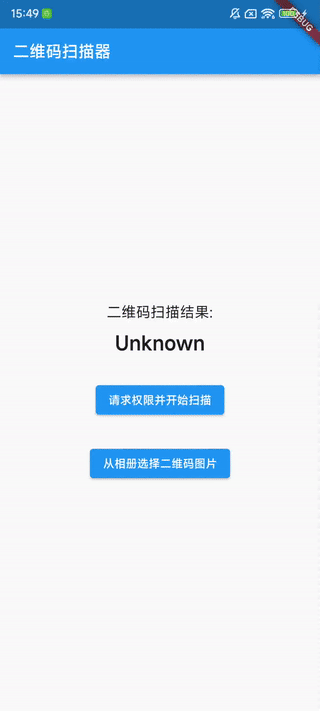Android中常用的布局方式有以下几种:
-
线性布局LinearLayout
-
相对布局RelativeLayout
-
表格布局TableLayout
-
层布局FrameLayout
-
绝对布局AbsoluteLayout
-
网格布局GridLayout
用的相对较多的是线性布局和相对布局。接下来重点演示这两种布局
其中,表格布局是线性布局的子类。网格布局是android 4.0后新增的布局。
(一)线性布局LinearLayout
线性布局中最重要的属性:orientation
horizontal(水平布局)和vertical(垂直布局)两种方式
属性名
- orientation 布局方式,有horizontal(水平布局)和vertical(垂直布局)两种方式
- id 组件名称
- layout_width 该组件的宽度
- layout_height 该组件的高度
- layout_weight 权重
- layout_gravity 该组件(在父容器)中的对齐方式
- gravity 该组件所含子组件在其内部的对齐方式
- background 设置背景图片或填充颜色
效果图

|
1 2 3 4 5 6 7 8 9 10 11 12 13 14 15 16 17 18 19 20 21 22 23 24 25 26 27 28 29 30 31 32 33 34 35 36 37 38 39 40 41 42 43 44 45 46 47 48 49 50 51 52 53 54 55 56 57 58 59 60 61 62 63 64 65 66 67 68 69 70 71 72 73 |
<?xml version="1.0" encoding="utf-8"?> <LinearLayout xmlns:android="http://schemas.android.com/apk/res/android" android:layout_width="match_parent" android:background="@color/gray" android:layout_height="match_parent" android:orientation="vertical"> <LinearLayout android:layout_marginTop="20dp" android:layout_width="match_parent" android:orientation="horizontal" android:layout_height="wrap_content"> <TextView android:text="权重1" android:layout_width="0dp" android:layout_weight="1" android:layout_height="wrap_content"/> <TextView android:text="权重2" android:layout_width="0dp" android:layout_weight="1" android:layout_height="wrap_content"/> <TextView android:text="权重3" android:layout_width="0dp" android:layout_weight="1" android:layout_height="wrap_content"/> <TextView android:text="权重4" android:layout_width="0dp" android:layout_weight="1" android:layout_height="wrap_content"/> <TextView android:text="权重5" android:layout_width="0dp" android:layout_weight="1" android:layout_height="wrap_content"/> </LinearLayout>
<LinearLayout android:layout_marginTop="20dp" android:background="@color/teal_200" android:layout_width="match_parent" android:gravity="center" android:layout_height="wrap_content"> <TextView android:text="第一个布局" android:layout_width="wrap_content" android:layout_height="wrap_content" /> </LinearLayout> <LinearLayout android:background="@color/purple" android:layout_width="match_parent" android:gravity="center" android:layout_height="wrap_content"> <TextView android:text="第二个布局" android:layout_width="wrap_content" android:layout_height="wrap_content" /> </LinearLayout> <LinearLayout android:background="@color/teal" android:layout_width="match_parent" android:gravity="center" android:layout_height="wrap_content"> <TextView android:text="第三个布局" android:layout_width="wrap_content" android:layout_height="wrap_content" /> </LinearLayout> </LinearLayout> |
(二)相对布局RelativeLayout
属性:
- android:layout_marginTop=“25dip” //顶部距离
- android:gravity=“left” //空间布局位置
- android:layout_marginLeft="15dip //距离左边距
相对于给定ID控件
- android:layout_above 将该控件的底部置于给定ID的控件之上;
- android:layout_below 将该控件的底部置于给定ID的控件之下;
- android:layout_toLeftOf 将该控件的右边缘与给定ID的控件左边缘对齐;
- android:layout_toRightOf 将该控件的左边缘与给定ID的控件右边缘对齐;
- android:layout_alignBaseline 将该控件的baseline与给定ID的baseline对齐;
- android:layout_alignTop 将该控件的顶部边缘与给定ID的顶部边缘对齐;
- android:layout_alignBottom 将该控件的底部边缘与给定ID的底部边缘对齐;
- android:layout_alignLeft 将该控件的左边缘与给定ID的左边缘对齐;
- android:layout_alignRight 将该控件的右边缘与给定ID的右边缘对齐;
相对于父组件
- android:layout_alignParentTop 如果为true,将该控件的顶部与其父控件的顶部对齐;
- android:layout_alignParentBottom 如果为true,将该控件的底部与其父控件的底部对齐;
- android:layout_alignParentLeft 如果为true,将该控件的左部与其父控件的左部对齐;
- android:layout_alignParentRight 如果为true,将该控件的右部与其父控件的右部对齐;
居中
- android:layout_centerHorizontal 如果为true,将该控件的置于水平居中;
- android:layout_centerVertical 如果为true,将该控件的置于垂直居中;
- android:layout_centerInParent 如果为true,将该控件的置于父控件的中央;
指定移动像素
- android:layout_marginTop 上偏移的值;
- android:layout_marginBottom 下偏移的值;
- android:layout_marginLeft 左偏移的值;
- android:layout_marginRight 右偏移的值;
效果图
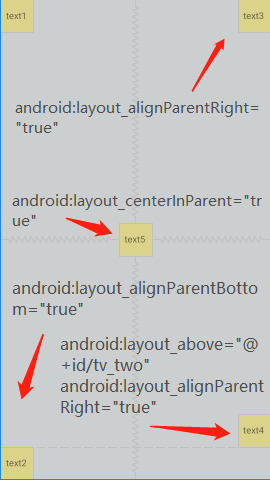
|
1 2 3 4 5 6 7 8 9 10 11 12 13 14 15 16 17 18 19 20 21 22 23 24 25 26 27 28 29 30 31 32 33 34 35 36 37 38 39 40 41 42 43 44 45 46 47 48 49 |
<?xml version="1.0" encoding="utf-8"?> <RelativeLayout xmlns:android="http://schemas.android.com/apk/res/android" android:layout_width="match_parent" android:background="@color/gray" android:layout_height="match_parent" android:orientation="vertical">
<TextView android:gravity="center" android:background="@color/teal" android:text="text1" android:layout_width="50dp" android:layout_height="50dp" /> <TextView android:id="@+id/tv_two" android:layout_alignParentBottom="true" android:gravity="center" android:background="@color/teal" android:text="text2" android:layout_width="50dp" android:layout_height="50dp" /> <TextView android:layout_alignParentRight="true" android:gravity="center" android:background="@color/teal" android:text="text3" android:layout_width="50dp" android:layout_height="50dp" /> <TextView android:layout_centerInParent="true" android:gravity="center" android:background="@color/teal" android:text="text5" android:layout_width="50dp" android:layout_height="50dp" /> <TextView android:layout_above="@+id/tv_two" android:layout_alignParentRight="true" android:gravity="center" android:background="@color/teal" android:text="text4" android:layout_width="50dp" android:layout_height="50dp" /> </RelativeLayout> |
(三)表格布局TableLayout
属性
三个常用属性
- android:collapseColumns:设置需要被隐藏的列的序号
- android:shrinkColumns:设置允许被收缩的列的列序号
- android:stretchColumns:设置运行被拉伸的列的列序号
(四)帧布局FrameLayout
FrameLayout(帧布局)可以说是六大布局中最为简单的一个布局,这个布局直接在屏幕上开辟出一块空白的区域,当我们往里面添加控件的时候,会默认把他们放到这块区域的左上角,而这种布局方式却没有任何的定位方式,所以它应用的场景并不多;帧布局的大小由控件中最大的子控件决定,如果控件的大小一样大的话,那么同一时刻就只能看到最上面的那个组件!后续添加的控件会覆盖前一个!虽然默认会将控件放置在左上角,但是我们也可以通过layout_gravity属性,指定到其他的位置!
效果图
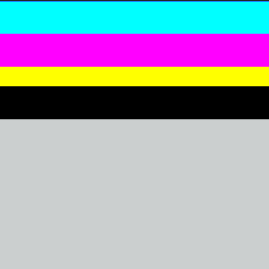
xml布局:
|
1 2 3 4 5 6 7 8 9 10 11 12 13 14 15 16 17 18 19 20 21 22 |
<?xml version="1.0" encoding="utf-8"?> <FrameLayout xmlns:android="http://schemas.android.com/apk/res/android" android:layout_width="match_parent" android:background="@color/gray" android:layout_height="match_parent"> <TextView android:background="#000000" android:layout_width="fill_parent" android:layout_height="180dp"/> <TextView android:background="#ffff00" android:layout_width="fill_parent" android:layout_height="130dp"/> <TextView android:background="#ff00ff" android:layout_width="fill_parent" android:layout_height="100dp"/> <TextView android:background="#00ffff" android:layout_width="fill_parent" android:layout_height="50dp"/> </FrameLayout> |
(五)绝对布局AbsoluteLayout
属性:
- 绝对布局又可以叫做坐标布局,可以直接指定子元素的绝对位置(xy)
- 由于手机屏幕尺寸差别比较大使用绝对定位的适应性会比较差,在屏幕的适配上有缺陷
常用属性:
- android:foreground:*设置改帧布局容器的前景图像
- android:foregroundGravity:设置前景图像显示的位置
- android:layout_x=”” 控制当前子类控件的x位置
- android:layout_y=”” 控制当前子类控件的y位置
效果图
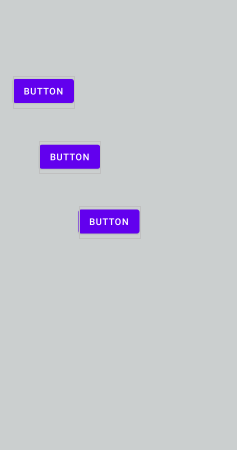
.xml布局
(六)网格布局GridLayout
和之前的TableLayout(表格布局) 有点类似,不过网格布局的好处是:
- 可以自己设置布局中组件的排列方式
- 可以自定义网格布局有多少行,多少列
- 可以直接设置组件位于某行某列
- 可以设置组件横跨几行或者几列
效果图
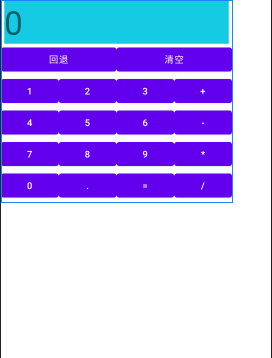
.xml布局:
|
1 2 3 4 5 6 7 8 9 10 11 12 13 14 15 16 17 18 19 20 21 22 23 24 25 26 27 28 29 30 31 32 33 34 35 36 37 38 39 40 41 42 43 44 45 46 47 48 49 50 51 52 53 54 55 56 57 |
<GridLayout xmlns:android="http://schemas.android.com/apk/res/android" xmlns:tools="http://schemas.android.com/tools" android:id="@+id/GridLayout1" android:layout_width="wrap_content" android:layout_height="wrap_content" android:columnCount="4" android:orientation="horizontal" android:rowCount="6" > <TextView android:layout_columnSpan="4" android:layout_gravity="fill" android:layout_marginLeft="5dp" android:layout_marginRight="5dp" android:background="#15CBE3" android:text="0" android:textSize="50sp" />
<Button android:layout_columnSpan="2" android:layout_gravity="fill" android:text="回退" />
<Button android:layout_columnSpan="2" android:layout_gravity="fill" android:text="清空" />
<Button android:text="1" />
<Button android:text="2" />
<Button android:text="3" /> <Button android:text="+" />
<Button android:text="4" />
<Button android:text="5" />
<Button android:text="6" /> <Button android:text="-" />
<Button android:text="7" />
<Button android:text="8" />
<Button android:text="9" /> <Button android:text="*" />
<Button android:text="0" /> <Button android:text="." />
<Button android:text="=" /> <Button android:text="/" /> </GridLayout> |
<GridLayout android:layout_width=“fill_parent”:网格布局宽度为填满屏幕
<GridLayout android:layout_height=“wrap_content”:网格布局高度为包裹内容
<GridLayout android:columnCount=“4”:网格布局设置 4 列
<GridLayout android:rowCount=“6”:网格布局设置 6 行
<GridLayout android:layout_columnSpan=“2”:清空和回退横跨两列
<GridLayout android:orientation=“horizontal”:网格布局设置为水平布局

